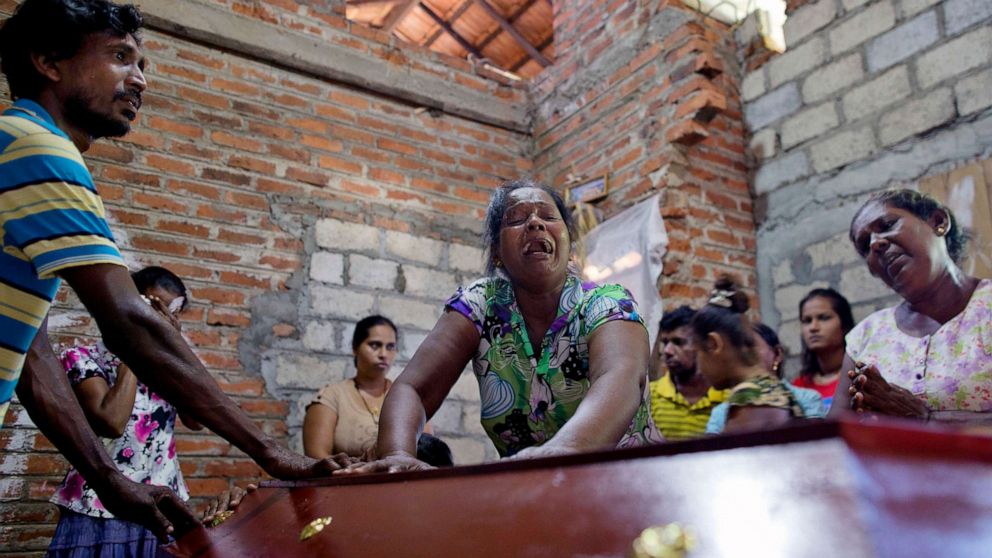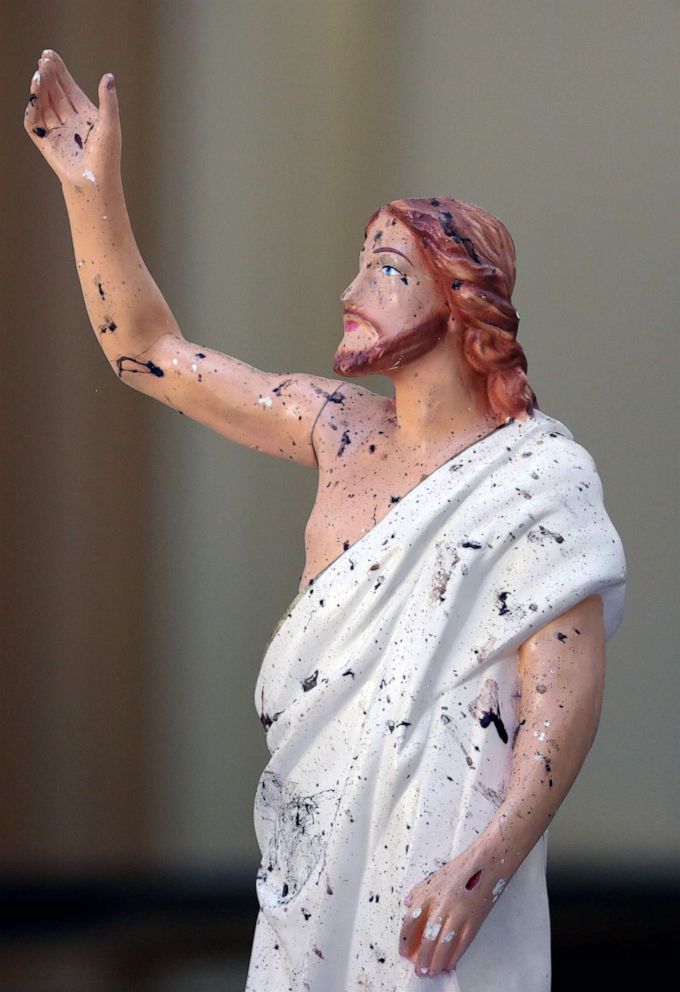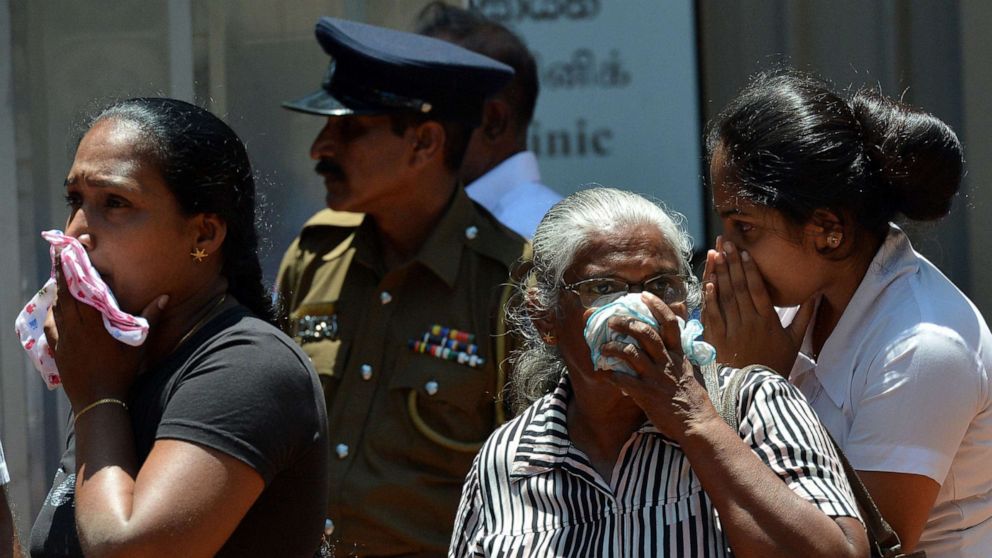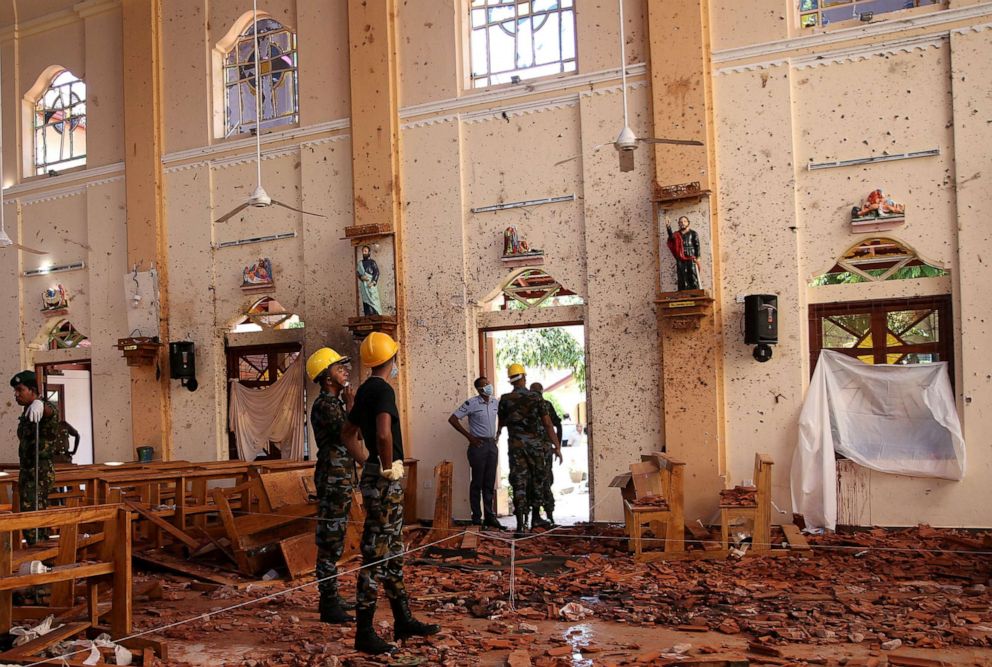Sri Lanka Easter suicide bombings blamed on domestic radical Muslim group

Members of a radical Muslim group have been identified as suspects in a series of Easter suicide bombings on churches and luxury hotels across Sri Lanka.
Coordinated explosions erupted near simultaneously Sunday morning across the island nation off the southern tip of India, killing nearly 300 people, injuring at least 500 and leaving government security officials scrambling to explain why warnings of an imminent terrorist attack went unheeded.
The attack is now being blamed on the local group National Thowfeek Jamaath, or NTJ.
“We do not believe these attacks were carried out by a group of people who were confined to this country,” Sri Lankan Health Minister Rajitha Senaratne said at a press conference. “There was an international network without which these attacks could not have succeeded.”
“The intelligence reports [indicate] that foreign terrorist organizations are behind the local terrorists,” Sri Lanka President Maithripala Sirisena’s office said in a statement. “Therefore, the president is to seek the assistance of the foreign countries.”
At least 11 foreigners were confirmed killed in the attacks, including two victims who were dual citizens of the United States and the United Kingdom. U.S. Secretary of State Mike Pompeo confirmed Sunday “several U.S. citizens were among those killed.”
Government officials admitted that international intelligence agencies had issued a warning earlier this month that NTJ was planning an attack. The alert was also emphasized in an April 9 report from the country’s defense ministry to its police chief, Senaratne said.
On April 11, he said, police passed along the warning to government officials in charge of security for the judiciary and diplomatic agencies, but it remains unclear what actions, if any, were taken to prevent the attacks from occurring.
Senaratne said Prime Minister Ranil Wickremesinghe, who was ousted by President Maithripala Sirisena last year only to be reinstated, and his cabinet members were not informed of the warning and blamed political turmoil for the miscommunication.
Harin Fernando — Sri Lanka’s minister of telecommunications, foreign employment and sports — tweeted a document he described as the security warning passed up the government’s chain of command.
“I honestly do feel there was a breach and as well as there’s been a big, massive miscommunication or somebody has taken this whole intelligence report very lightly and thought, ‘No, it’s not possible,” Fernando said in an interview on CNN.
“What’s ironic is this particular report was not considered with the cabinet or mentioned to the cabinet, and this looms a huge doubt on why and how this lapse actually happened,” Fernando said.
Police said 24 suspects have been arrested so far in connection with the bombings. Senaratne said all of the suspects are Sri Lankan nationals.
The explosions unfolded Sunday when at least seven suicide bombers detonated devices inside three Christian churches packed with people celebrating Easter services as well as three hotels popular among Western tourists, officials said. There were eight simultaneous explosions around 8:45 a.m. local time.
Video from inside St. Sebastian’s Church in Negombo, a coastal city about 40 miles north of Colombo, showed the immediate aftermath as worshipers were surrounded by devastation, death and chaos.
There were about 500 people at St. Sebastian’s Easter Mass when the explosion took place, according to church officials. Parishioners, many bleeding, scrambled to carry severely injured people from the church, which was littered with overturned chairs, shattered glass and debris from the ceiling.
St. Anthony’s Shrine, a Catholic church in Colombo, and Zion Church in Batticaloa were also attacked. Colombo is on the western side of Sri Lanka, while Batticaloa is on the eastern shore, about 200 miles from the capital.
Shangri-La Hotel, Cinnamon Grand Hotel and Kingsbury Hotel, all located in Colombo — and all popular with tourists — were also targeted. An explosion also occurred near an overpass in the area of Dematagoda near Colombo, the Associated Press reported.
Hours after the initial bombings, a ninth occurred at a guest house in Colombo, killing at least two people, according to police.
Akshat Saraf, 30, a financial adviser from India, said in an interview Monday on ABC’s “Good Morning America” that he and his family were vacationing in Sri Lanka and staying at the Shangri-La Hotel when a blast on in a third-floor restaurant shook their room on the 25th floor.
“My family was about to leave for breakfast. From the room is when we hard the loud explosion,” Saraf said. “There were two explosions that took place in a matter of a few seconds. When I heard the first one, I frankly just thought it was a loud thunderstorm.”
He said he looked out his window, saw people pointing at the hotel and knew something was “not right.”
“My wife and I just grabbed our passports and decided to evacuated. At that point, the hotel did not announce the evacuation alarms,” Saraf said on GMA. “We decided to take the emergency exit and climb down 25 floors, and when we reached the third or fourth floor was when we could see there was blood on the stairs and we thought something has definitely happened in this building.”
The threat did not appeared to be over Monday morning as officials continued to find explosive devices that had not detonated.
A Sri Lankan Air Force spokesman confirmed to ABC News that a suspicious van booby trapped with gas cylinders was detected outside St. Anthony’s Shrine in Colombo Monday and was promptly disposed of in a controlled explosion by Sri Lanka Air Force’s Explosive Ordnance Disposal team. On Sunday night, a large pipe bomb was found on a road leading to the international airport in Colombo and was disposed.
Meanwhile, the U.S. Embassy in Sri Lanka increased a warning for travel in Sri Lanka from a Level 1 to a Level 2, advising tourists to exercise increased caution due to terrorism.
“Terrorist groups continue plotting possible attacks in Sri Lanka,” embassy officials said in a statement. “Terrorists may attack with little or no warning, targeting tourist locations, transportation hubs, markets/shopping malls, local government facilities, hotels, clubs, restaurants, places of worship, parks, major sporting and cultural events, educational institutions, airports, and other public areas.”
Security was also boosted in the United States. Police in Los Angeles and New York upped patrols around places of worship, including St. Patrick’s Cathedral in Manhattan.
Source: Read Full Article



